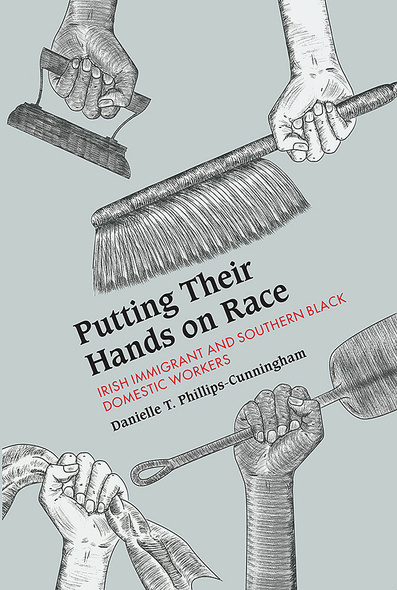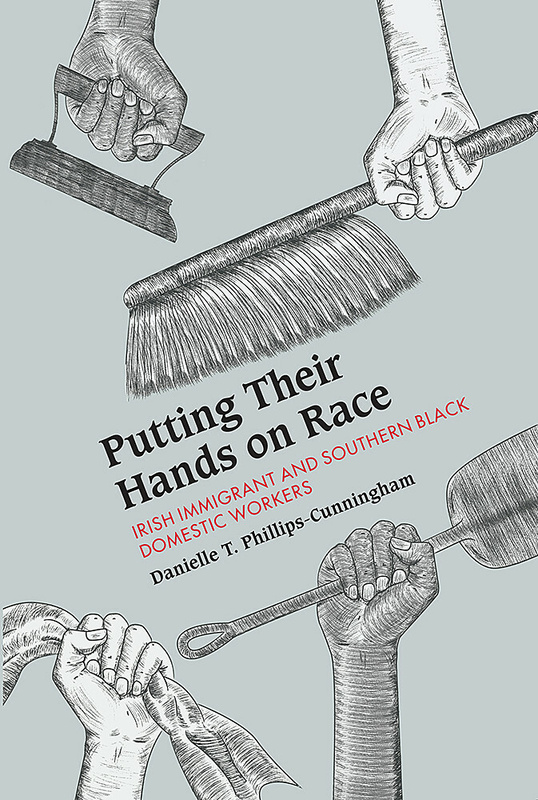
264 pages, 6 x 9
10 B-W illustrations
Paperback
Release Date:13 Dec 2019
ISBN:9781978800465
Hardcover
Release Date:13 Dec 2019
ISBN:9781978800472
Putting Their Hands on Race
Irish Immigrant and Southern Black Domestic Workers
Rutgers University Press
Winner of the 2020 Sarah A. Whaley Book Prize from the National Women's Studies Association
Putting Their Hands on Race offers an important labor history of 19th and early 20th century Irish immigrant and US southern Black migrant domestic workers. Drawing on a range of archival sources, this intersectional study explores how these women were significant to the racial labor and citizenship politics of their time. Their migrations to northeastern cities challenged racial hierarchies and formations. Southern Black migrant women resisted the gendered racism of domestic service, and Irish immigrant women strove to expand whiteness to position themselves as deserving of labor rights. On the racially fractious terrain of labor, Black women and Irish immigrant women, including Victoria Earle Matthews, the “Irish Rambler”, Leonora Barry, and Anna Julia Cooper, gathered data, wrote letters and speeches, marched, protested, engaged in private acts of resistance in the workplace, and created women’s institutions and organizations to assert domestic workers’ right to living wages and protection.
Putting Their Hands on Race offers an important labor history of 19th and early 20th century Irish immigrant and US southern Black migrant domestic workers. Drawing on a range of archival sources, this intersectional study explores how these women were significant to the racial labor and citizenship politics of their time. Their migrations to northeastern cities challenged racial hierarchies and formations. Southern Black migrant women resisted the gendered racism of domestic service, and Irish immigrant women strove to expand whiteness to position themselves as deserving of labor rights. On the racially fractious terrain of labor, Black women and Irish immigrant women, including Victoria Earle Matthews, the “Irish Rambler”, Leonora Barry, and Anna Julia Cooper, gathered data, wrote letters and speeches, marched, protested, engaged in private acts of resistance in the workplace, and created women’s institutions and organizations to assert domestic workers’ right to living wages and protection.
Danielle Phillips-Cunningham's Putting Their Hands on Race is a pioneering comparative analysis of the distinct and overlapping labor and migration histories of Irish immigrant and Black domestic workers, as well as their activist struggles against exploitation and stereotyping. Employing familiar racial formation theory and intersectional feminist theory in complex ways, this interdisciplinary project makes important contributions to whiteness studies, African American Studies, Women's Studies, and labor history.
Danielle Phillips-Cunningham has produced a remarkable comparative history of Irish and African American domestic workers that illuminates the processes of racialization and points to possibilities for cross-racial political alliances. Deeply researched and theoretically sophisticated, this book is a must-read for anyone interested in labor history.
Putting Their Hands on Race remains an effective synthesis of the existing literature on the intersections of race and labor, with a focus on the unique experiences and efforts of women. It is a good starting place for those interested in intersectional and comparative forms of history. The focus on Irish immigrant and southern Black migrant women also offers plenty of room for comparison to other groups of women.
The original and valuable contribution of Putting Their Hands on Race is placing women at the theoretical center of the question of how the Irish became ‘White’ and African Americans remained static. A gendered analysis both complicates and clarifies our understanding, and that is a noteworthy accomplishment.
Danielle Phillips-Cunningham is an associate professor of multicultural women’s and gender studies at Texas Woman’s University in Denton, Texas.
Introduction
1 Putting Racial Formation Theory to Work:
A Women-Centered, Transdisciplinary, and Intersectional Approach
2 The Lost Files of Irish Immigration History:
The Irish Woman Question and Racialized Manual Labors
3 Southern Mammy and African American “Immigrant” Women:
Reconstituting White Supremacy after Emancipation
4 Too Irish, Too Rural, Too Black
A.K.A. “The Servant Problem
5 Irish Women Whiten Themselves,
African American Women Demand the Unseen
6 Irish Immigrant Women Settle into White,
African American Women Dignify Domestic Service
Conclusion
Acknowledgements
Notes
Bibliography
Index
1 Putting Racial Formation Theory to Work:
A Women-Centered, Transdisciplinary, and Intersectional Approach
2 The Lost Files of Irish Immigration History:
The Irish Woman Question and Racialized Manual Labors
3 Southern Mammy and African American “Immigrant” Women:
Reconstituting White Supremacy after Emancipation
4 Too Irish, Too Rural, Too Black
A.K.A. “The Servant Problem
5 Irish Women Whiten Themselves,
African American Women Demand the Unseen
6 Irish Immigrant Women Settle into White,
African American Women Dignify Domestic Service
Conclusion
Acknowledgements
Notes
Bibliography
Index







